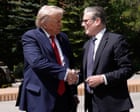Steel trade unions have said it is “absolutely vital” that the UK rapidly secures a deal to protect the sector from Donald Trump’s tariffs, after the industry was excluded from an initial UK-US pact signed last night.
Keir Starmer and Trump signed off a UK-US trade dealat the G7 summit in Canada, with the US president saying Britain would have protection against future tariffs “because I like them”.
The car industry was relieved that tariffs on the sector will be reduced to 10% from 27.5%. The UK aerospace sector will face no tariffs at all from the US after deal, which followed aninitial agreement made in May.
However, the announcement of the deal did not include the removal of tariffs on steel imports. UK steelmakers still face 25% tariffs, although this is lower than the global tariff of 50% imposed by the Trump administration on other nations.
The UK business department said the two leaders had pledged to “make progress towards 0% tariffs on core steel products as agreed”.
Alasdair McDiarmid, the assistant general secretary of the steel union Community, welcomed the progress that has been made on reaching a deal on steel.“However, it’s now absolutely vital that a deal for steel is secured as soon as possible,” he said. “Our steel producers and their US customers need an end to the current state of uncertainty to allow normal business to resume.
“Crucially, we must see a full exemption for all UK steel exports to the US – without that guarantee some of our leading steel businesses could be left behind, with a threat to jobs and livelihoods.”
A steel industry source said the automotive deal had been widely expected to be completed before steel and aluminium. However, the person said “we now need steel to happen pretty quickly” to avoid the risk of 50% tariffs kicking in on 9 July, under the terms of the UK’s temporary exemption.
Ministers have been working to ensure the UK’s biggest steelmaker, Tata Steel, is included in tariff-free accessto the US. Its bosses fear that the deal could end up excluding Indian-owned Tata Steel, which runs the vast Port Talbot steelworks in south Wales, because of the origin of some of its products. The company exports more than $100m (£74m) worth of goods to the US every year.
Sign up toBusiness Today
Get set for the working day – we'll point you to all the business news and analysis you need every morning
after newsletter promotion
Separately, British Steel has secured a new five-year supply contract with Network Rail worth more than £500m, under which British Steel will supply between 70,000 and 80,000 tonnes of rail a year. McDiarmid welcomed the extension but expressed concern that “British Steel’s share of the Network Rail contract is set to reduce significantly”.
Mike Hawes, the chief executive of the Society of Motor Manufacturers and Traders, told BBC Radio 4’s Today programme he hoped the new 10% tariff rate for UK carmakers would start “in the next few days”.The UK-US trade pact had been negotiated in early May, “but we’ve been waiting for it to be implemented so manufacturers can start shipping without being subject to those punitive tariffs”, he said.
He added that “a lot less” had been exported to the US in the meantime, and some UK manufacturers had halted shipments. British luxury carmakers Jaguar Land Rover and Bentley areamong those that paused shipments.“They’ve been pausing because their customers – we’ve got shrewd customers – were going to wait and see what was going to happen,” Hawes said. “You could see that the cost to the ultimate consumer was going to come down because of the reduction in the tariff, but you just didn’t know when.”He expressed confidence that the new tariffs would be in place for some time, saying that “it’s been long negotiated and as the president says, he likes the UK”. He noted that UK exports have never been a threat to the US, as they tend to be small volume, high value manufactured goods, “not the type that are made in the US”.
